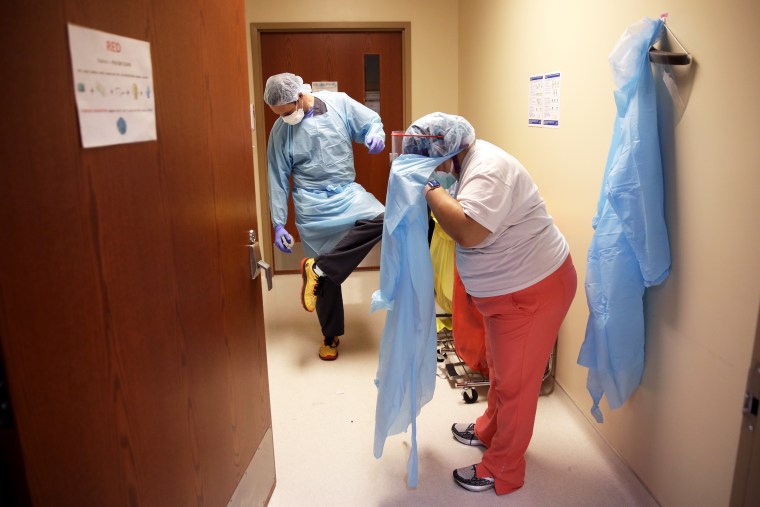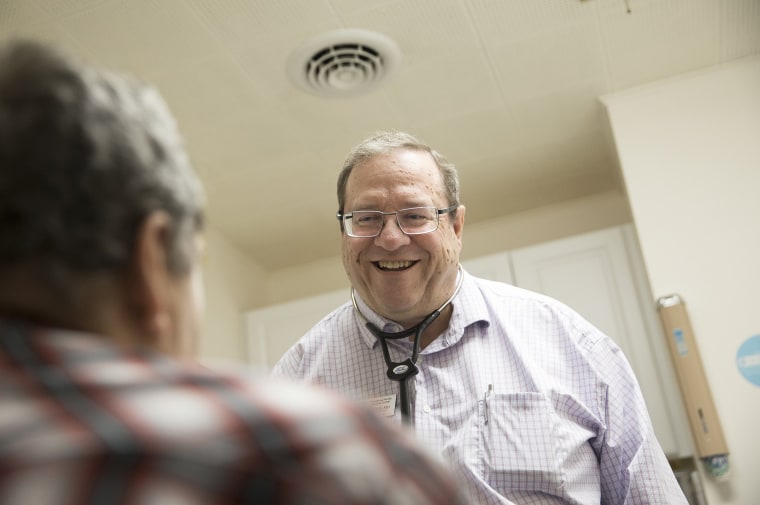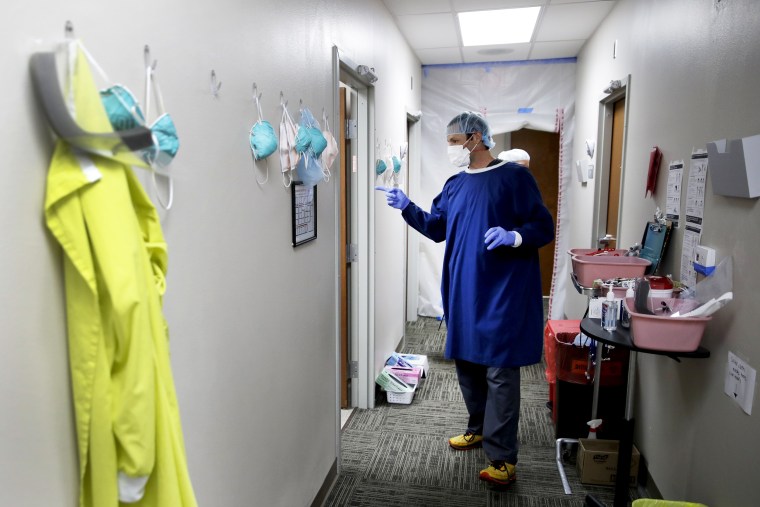On Thursday night, Dr. Thomas Huth, vice president of medical affairs for Reid Health in Richmond, Indiana, plans to become the first person to get a coronavirus vaccine shot at his rural hospital, which will be one of the first in the country to receive the Pfizer vaccine.
His has two goals: to prevent potentially spreading the virus to his elderly patients and to communicate to the surrounding rural communities that the vaccine is safe and available.
"We plan to do that on camera in a very public way to help people feel comfortable with the vaccine," Huth said. "It's important that as a health care leader in this area, we're also leading the way on this important initiative."
Rural communities will have a particular challenge in distributing the vaccine, as officials and health care workers will have to quickly cobble together communications networks across large areas while contending with faltering and underfunded public health systems. On top of all that, distrust of medical advice is rampant — much of it shared, sown and re-emphasized by President Donald Trump, who has many supporters in rural areas.
So, beyond their work to mitigate the country's worst health disaster in modern history, health care workers in many of these regions are also having to combat bad information and encourage their patients to get the shot once it's available.
Huth said his hospital is the main point of contact for vaccinations for the four rural counties surrounding its campus in Richmond. Its officials are working to identify about 1,300 front-line health care and nursing home workers, who will be the first ones to receive the vaccine, followed by members of the general public.
The first shots — all administered to doctors — will be broadcast on a public Zoom call Thursday night, hours after the hospital first receives the vaccine, so the public can see the process and hear the doctors' thoughts. Other health care workers can begin getting vaccinated at 5:30 a.m. CT Friday.
It's important for local health care professionals to be able to say: 'Hey, I got the vaccine. It's safe, it's efficacious. I’ve looked at the data. I feel comfortable, and you should, too.'
The hospital will get only 975 doses initially, so it expects heavy competition for the vaccine, Huth said, and it is trying to figure out distribution strategies.
"The most significant communication problem is: How do you make sure we're getting all the people that we want vaccinated as soon as possible?" he said. "We want to get as many of our own staff and doctors vaccinated who are at the highest risk, and we're making efforts to set up those lists and communication networks now. But, more significantly, we want the nursing home staff to get vaccinated early, because that's where the majority of our very sickest patients come from."
'It's getting to be equivalently bad everywhere'
The vaccinations are key because the virus is hitting rural areas, like Tim Putnam's home in southeast Indiana, particularly hard. Putnam, the president and CEO of Margaret Mary Health, a community hospital in Batesville, said that the hospital has been fighting the disease since March and that "there's nothing slowing it."
It's increasingly a challenge nationwide. In the country's rural regions — where some leaders haven't required residents to follow mask mandates or other pandemic precautions — the virus is spreading at an alarming rate. The pace of transmission in those areas takes on new dimensions, as it's especially difficult to get medical care at times.
So while the vaccine feels like a godsend to many, rural providers said it would prove to be one only if they can persuade their patients to take it.
"Phase one of vaccine distribution has health care workers inoculated first, which does two things: First, I don't think anyone in the country wants to put the front-line health care staff at risk. But, almost more importantly, they're a pretty well-educated group," Putnam said. "I think acceptance in that group will help the general public in these small towns, because then they'll have someone they know who has made a pretty informed decision."
Many rural hospitals are near capacity, struggling to transfer critical patients to better-resourced medical centers and facing rampant staffing challenges.

"It's getting to be equivalently bad everywhere," said Brock Slabach, senior vice president of the National Rural Health Association. "And I find that to be quite a scary condition."
Four days this month have had more deaths in America from the coronavirus than in the Japanese attacks on Pearl Harbor, Hawaii, on Dec. 7, 1941, which killed more than 2,300 people. More people in the U.S. died from Covid-19 on Wednesday than in the Sept. 11, 2001, terrorist attacks.
Perhaps in response to the steadily growing number of deaths in the United States, Americans' willingness to get the vaccine has grown in recent weeks. It has reached 63 percent, Gallup reported Tuesday, a steep climb after a low point of 50 percent in September.
While that may be an encouraging sign, the number of those vaccinated needs to be even higher for the country to return to some sense of normalcy.
Experts at the World Health Organization said countries would need to inoculate 65 percent to 70 percent of their populations for the vaccinations to provide herd immunity, and the rate is likely to need to be even higher. Until that threshold is reached, most authorities agree, it would be deadly to fully lift Covid-19 restrictions.
"That's why I think it's important for local health care professionals to be able to say: 'Hey, I got the vaccine. It's safe, it's efficacious. I've looked at the data. I feel comfortable, and you should, too,'" said Bill Finerfrock, executive director of the National Association of Rural Health Clinics. "I think that's another aspect of this public education message that can be very effective in helping to ensure that folks in these rural communities also get the vaccine when it's available."
Finerfrock emphasized the need to communicate that especially to communities of color, which have historic reasons — such as the Tuskegee syphilis study — to be hesitant to accept medical care from the government.
"We still have a legacy that has left a strong imprint," he said. "That distrust is going to be a big challenge."
'We want to be good stewards of the vaccine'
The responsibility of distributing the vaccine weighs heavily on medical workers. Every vial, doctors said, is invaluable, and there is a fear that, because of its short shelf life, some could be wasted.
Dr. Keith Davis, who runs a small clinic in Shoshone, Idaho, said he expects to receive some doses of the Pfizer vaccine this week. Once he pulls the vaccine from its deep freeze and it is thawed out, his clinic must administer it within six hours.
The trouble is that each vial comes with five doses, which means he needs to ensure that he has five patients ready to get the shots almost as soon as the doses are ready.

"We're looking at a five-dose vial that, once it's reconstituted or diluted with the sterile saline, it has to be used within six hours," he said. "We really want people lined up for all the doses that we're going to reconstitute, because they have to be used that day, and we want to be good stewards of the vaccine."
Davis' staff members started working up lists of people who were most in need of the vaccine Thursday, and he hopes others will follow their example.
"I'm going to wear short-sleeved shirts to work now, so I can get the vaccine without even rolling up my sleeves," he said with a laugh.
Medical reality vs. conspiracy theories
Still, one of the more difficult issues, and perhaps the most frustrating, is the number of conspiracy theories that have run rampant this year, especially about the medical community.
Doctors said there is a distinct difference between hesitance about taking a vaccine that received emergency authorization from the federal government and the blatant disregard of medical advice that appears to have grown this year.
Multiple rural providers said they are concerned that many of their patients are being misinformed and are taking the conspiracy theories they see online seriously.
Some are people they've known and treated for years.
Dr. Steven Luking, who runs a family practice in rural North Carolina, said a longtime patient told him that the virus had been overhyped by the medical industry to make more money — disregarding that most doctors, nurses and medical facilities are earning much less during the pandemic.
"There's a lot of magical thinking and a lot of erroneous thinking," he said. "I've had folks seriously ask me if I think the vaccine will include some kind of tracking device so that the deep state can keep track of them."
Because of the pandemic, Luking hasn't seen his son in about a year. Plastic sheets have effectively split his home in half since March, because he treats sick patients every day and his wife's asthma makes her vulnerable to Covid-19.
He chuckled softly as he recalled some of the theories he'd heard.
"I always tell them that Uncle Sam couldn't care less whether they're at Bojangles or Hardee's on any given Saturday," he said. "Then I say they need to get the flu shot and, by gum, to get the Covid vaccine when it comes, too."

